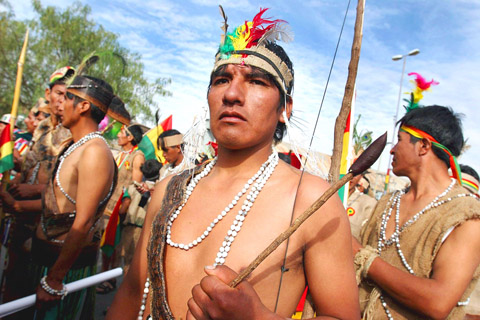Protesters blocked an airport in southern Bolivia on Thursday to prevent a visit from Bolivian President Evo Morales, as the nation remained bitterly divided ahead of a recall referendum.
David Cruz, leader of a teachers’ union in Pando department, said protesters placed four tractors on the runway of the Cobija airport to keep the president from being able to land.
“Morales comes to make promises he won’t keep,” Cruz told Fides radio.

PHOTO: EPA
Anti-government groups also prevented Morales from going to Santa Cruz and Beni the previous day. Earlier this week protests at an airport in Tarija prompted him to scrap a planned meeting with the presidents of Argentina and Venezuela.
Morales canceled a visit to Sucre for Independence Day celebrations after local authorities did not guarantee his security.
“These are factious groups paid by the [opposition] governors,” presidential minister Juan Ramon Quintana told state-run radio Patria Nueva.
Morales presided over a parade of the armed forces and indigenous groups on Thursday in the central city of Cochabamba, where he thanked the military for its support.
“I encourage you defend this process of change,” Morales said.
The president and eight of the country’s nine regional governors are subject to recall in Sunday’s vote. Morales sought the referendum in a bid to strengthen his hand in disputes with governors who are seeking more autonomy from the central government, but polls suggest that both he and his rivals will likely survive the vote.
Two miners were killed in violent protests on Tuesday.
Morales is expected to survive the recall vote this weekend but a political crisis in South America’s poorest country may intensify as right-wing opponents try to block his socialist reforms.
Morales, Bolivia’s first indigenous leader and a former coca farmer, hopes a recall win will allow him to relaunch reforms such as nationalizations and land redistribution in the landlocked Andean country.
“I’m going to vote for him because he does good things for peasant farmers,” said Ignacia Cordero, a wheat and potato farmer from El Alto near La Paz, dressed in a woolen hat and traditional multilayered, multicolored skirts.
“He gives money to the aged, and for children too,” the 67-year-old said, her four-year-old grandson slung over her back in a piece of woven cloth. “He won’t lose. There are plenty of farmers like me who will vote for him.”
While Morales remains popular, his reforms have increasingly divided the country.
He has already nationalized energy, mining and telecommunications businesses and is distributing some of the proceeds to Bolivia’s poorest in the form of handouts.

POLITICAL PRISONERS VS DEPORTEES: Venezuela’s prosecutor’s office slammed the call by El Salvador’s leader, accusing him of crimes against humanity Salvadoran President Nayib Bukele on Sunday proposed carrying out a prisoner swap with Venezuela, suggesting he would exchange Venezuelan deportees from the US his government has kept imprisoned for what he called “political prisoners” in Venezuela. In a post on X, directed at Venezuelan President Nicolas Maduro, Bukele listed off a number of family members of high-level opposition figures in Venezuela, journalists and activists detained during the South American government’s electoral crackdown last year. “The only reason they are imprisoned is for having opposed you and your electoral fraud,” he wrote to Maduro. “However, I want to propose a humanitarian agreement that

ECONOMIC WORRIES: The ruling PAP faces voters amid concerns that the city-state faces the possibility of a recession and job losses amid Washington’s tariffs Singapore yesterday finalized contestants for its general election on Saturday next week, with the ruling People’s Action Party (PAP) fielding 32 new candidates in the biggest refresh of the party that has ruled the city-state since independence in 1965. The move follows a pledge by Singaporean Prime Minister Lawrence Wong (黃循財), who took office last year and assumed the PAP leadership, to “bring in new blood, new ideas and new energy” to steer the country of 6 million people. His latest shake-up beats that of predecessors Lee Hsien Loong (李顯龍) and Goh Chok Tong (吳作棟), who replaced 24 and 11 politicians respectively

Young women standing idly around a park in Tokyo’s west suggest that a giant statue of Godzilla is not the only attraction for a record number of foreign tourists. Their faces lit by the cold glow of their phones, the women lining Okubo Park are evidence that sex tourism has developed as a dark flipside to the bustling Kabukicho nightlife district. Increasing numbers of foreign men are flocking to the area after seeing videos on social media. One of the women said that the area near Kabukicho, where Godzilla rumbles and belches smoke atop a cinema, has become a “real

‘WATER WARFARE’: A Pakistani official called India’s suspension of a 65-year-old treaty on the sharing of waters from the Indus River ‘a cowardly, illegal move’ Pakistan yesterday canceled visas for Indian nationals, closed its airspace for all Indian-owned or operated airlines, and suspended all trade with India, including to and from any third country. The retaliatory measures follow India’s decision to suspend visas for Pakistani nationals in the aftermath of a deadly attack by shooters in Kashmir that killed 26 people, mostly tourists. The rare attack on civilians shocked and outraged India and prompted calls for action against their country’s archenemy, Pakistan. New Delhi did not publicly produce evidence connecting the attack to its neighbor, but said it had “cross-border” links to Pakistan. Pakistan denied any connection to